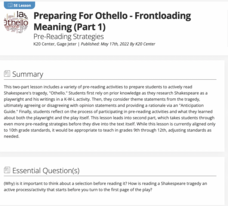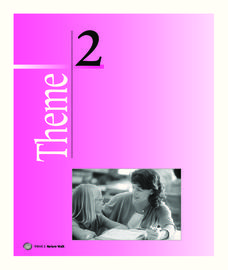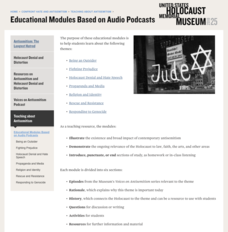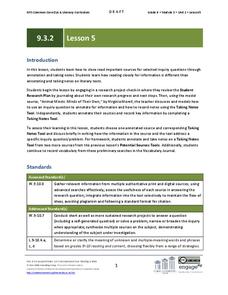Council for Economic Education
Why Didn't China Discover the New World?
Who was Zheng He and why haven't we heard of him? Scholars consider the question as they compare his vast expeditionary force to that of Christopher Columbus. Young historians then ponder the intersection of science, economics, and...
Poetry4kids
How to Write a Funny Epitaph Poem
What can happen if you eat too much cafeteria food? Or wear dirty clothes every day? Or talk back to your mother? Use a lesson on humorous poems as a way for students to practice silly rhymes as fictional epitaphs.
Academy of American Poets
Teach This Poem: "Violin" by Nikki Wallschlaeger
Nikki Wallschlaeger's Violin is the featured poem in a lesson that uses music and multiple readings to delve deep into its analysis. After a writing warm-up, learners watch and listen to a video that showcases Regina Carter Quintet's...
K20 LEARN
Preparing for Othello - Frontloading Meaning (Part 1): Pre-reading Strategies
The success of any lesson based on a complex text relies heavily on what instructors do before beginning the reading. Before reading Othello, scholars engage in a series of pre-reading activities, including completing an anticipation...
University of Minnesota
Motor Learning and Memory
What do our brains have to do with reaction timing? Everything! In a hands-on learning activity, young scientists participate in four card activities that measure reaction timing. Each activity gets progressively more complex, and...
EngageNY
Grade 10 ELA Module 1: Unit 1, Lesson 5
If you've ever wished you could respond to an author's message, an instructional activity that connects three poems with the same concept will appeal to you. Based on the first few lessons' focus on Christopher Marlowe's "The Passionate...
Houghton Mifflin Harcourt
Nature Walk: Extra Support Lessons (Theme 2)
Reinforce concepts such as long vowels, spelling patterns, sound clusters, double-final consonants, and syllables with a nature-themed unit. Through a series of extra support lessons, learners compare and contrast using a Venn diagram,...
EngageNY
Grade 9 ELA Module 3, Unit 2, Lesson 3
Ninth graders hone their research questions in a lesson plan focusing on accurate search engine techniques. Continuing a unit on inquiry-based learning based on Temple Grandin's Animals in Translation, the lesson plan guides learners...
NPR
Women Of Jamestown Lesson Plan
To better understand the role women played in early 17th century US history, class members examine the National Women's History Museum's online exhibit, Building the New World: the Women of Jamestown Settlement. After studying the 11...
Chicago Botanic Garden
Impacts of Climate Change
Scholars become experts on the eight major impacts of climate change through a jigsaw and grand conversation. They then research and present what they learned about effects specific to their region.
EngageNY
Equivalent Ratios II
What is the connection between equivalent ratios? Class members first find the multiplication factor used to create equivalent ratios. Next, they take that information to determine whether ratios are equivalent. The second lesson on...
University of Minnesota
Neurotransmission Model
Don't lose your marbles — you'll need them for a lesson on neurotransmission. Young scholars build a neurotransmission model using marbles, beads, rubber bands, string, and other elements. After studying specific neurotransmitters,...
Scholastic
Analyzing Media Messages
Telling young people to just say no can be difficult in a world that inundates them with messages to just say yes. A lesson on media messages encourages teenagers to analyze song lyrics and advertisements that mention drugs and/or...
US Holocaust Museum
Educational Modules Based on Audio Podcasts
Imagine hearing someone claim an event like the Holocaust never happened. Pupils use audio podcasts and reading passages to dive into the lives of those impacted by the Holocaust of World War II. Using the information they gather, class...
EngageNY
Grade 9 ELA Module 1, Unit 1, Lesson 17
Eighth graders demonstrate their understanding with the final assessment in a literary analysis unit based on Karen Russell's short story, "St. Lucy's Home for Girls Raised by Wolves." Having prepared for the assessment in the last few...
EngageNY
Grade 9 ELA Module 3, Unit 1, Lesson 4
Can dogs feel shame? Explore the anthropomorphic connection between human emotions and animal behavior—or lack thereof—with a lesson about Temple Grandin's book, Animals in Translation. Ninth graders continue a close reading of chapter...
Houghton Mifflin Harcourt
Around Town: Neighborhood and Community: English Language Development Lessons (Theme 3)
Here is a unit designed to support English language development. Scholars speak, move, and write to learn more about topics that focus on community and local concepts. The series of lessons aids to reinforce concepts including consonant...
EngageNY
Grade 9 ELA Module 3, Unit 2, Lesson 5
Once you find and evaluate your sources, it's time to discern the most helpful information. In a research lesson plan based on questions derived from Temple Grandin's Animals in Translation, practice annotation and taking notes.
Intel
Biomes in Action
A STEM project-based learning lesson, number four in a series of 10, focuses on human impacts to biomes around the world. Groups work together as environmentalists to research a specific biome, investigating human impacts on it. From...
Chicago Botanic Garden
Faces of Climate Change
Sometimes, the best solution to a problem can be found by walking in someone else's shoes. Here, scholars use character cards to take on the roles of people around the world. They determine how their character's life affects our...
Beyond Benign
Ecological Footprint
How does your lifestyle measure up in terms of your ecological footprint? Young ecologists examine their impact on the planet using an insightful online calculator. A short quiz asks users to rank the size of their homes, their energy...
iCivics
Mini-Lesson: The Incumbent Advantage
Does the person running for re-election have an advantage over the challenger? Scholars explore the concept of incumbent advantage during elections using an informative mini-lesson explaining the legislative branch. In pairs, they...
iCivics
Mini-Lesson: Presidential Succession
Who is in line for the presidency? Learners research the line of succession in the executive branch. They analyze the role the cabinet plays in a situation where the president and vice president are not able to serve. Along the way,...
Judicial Learning Center
The Judge and the Jury: Trial by Jury
Why is it so important to have a trial by jury in the American judicial system? This right is one of the hallmarks of American democracy, but it also comes with the responsibility of serving on a jury if called. Young legal scholars...
Other popular searches
- Guidance Lessons on Respect
- Guidance Lessons on Empathy
- Lessons on Authors Purpose
- Botany Lessons on Fruit
- Onomatopoeia Lessons
- Lessons on Segregation
- Lessons on Plate Tectonics
- Reading Lessons on Frogs
- Lessons on Map Reading
- Lessons on American Authors
- Lessons on Oceans
- Lessons on Antigone

























